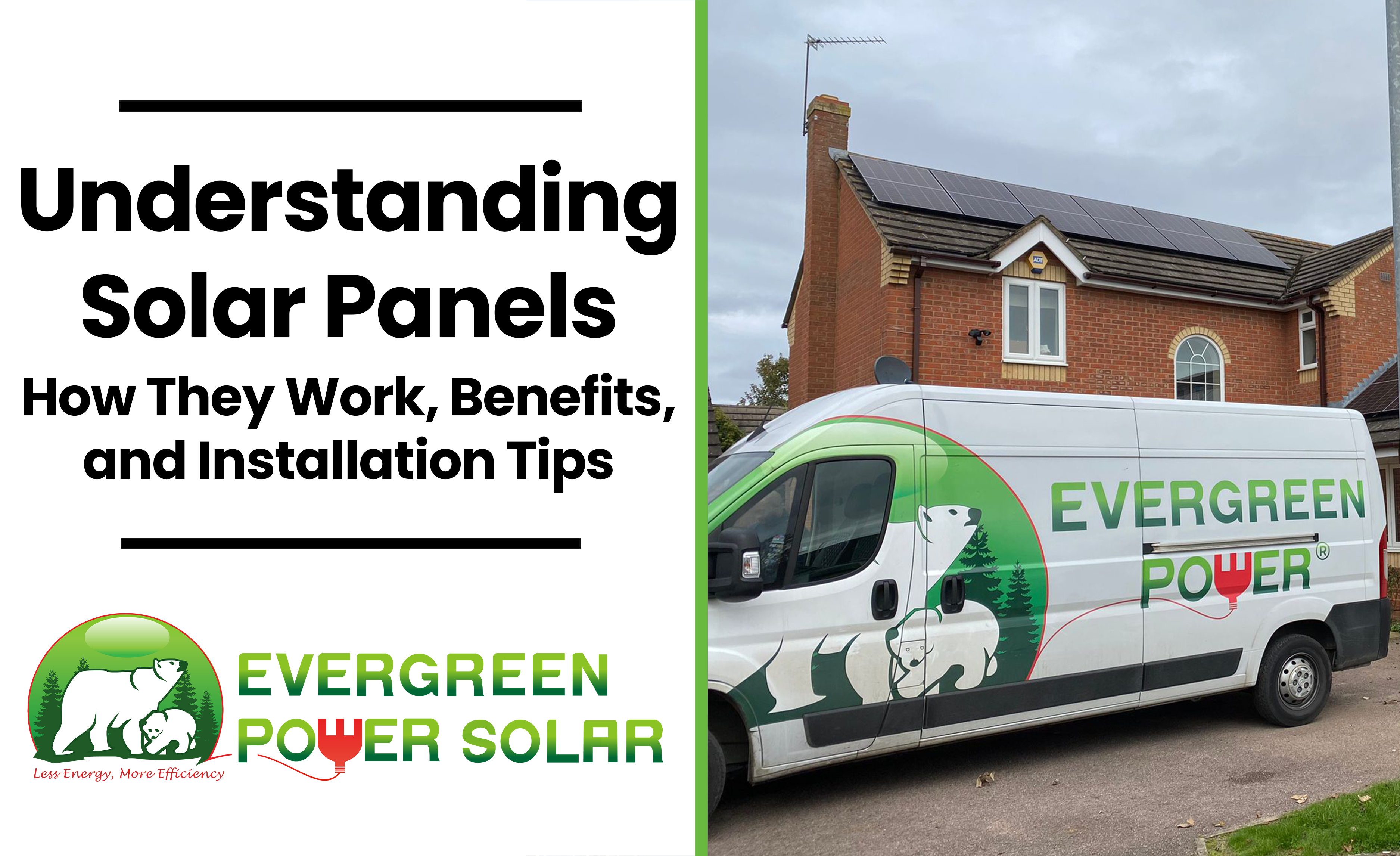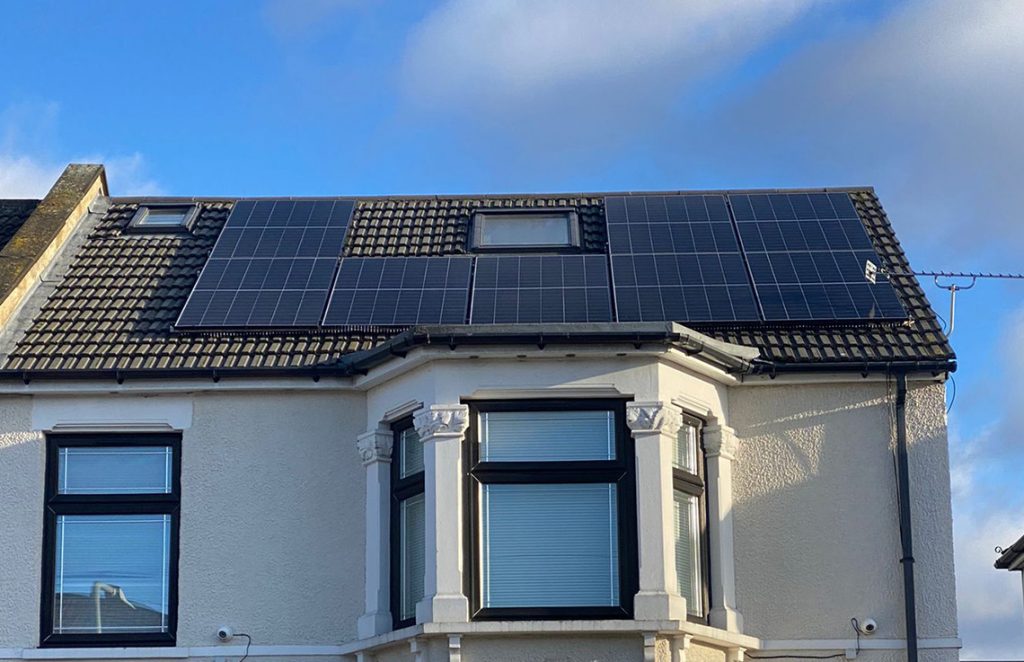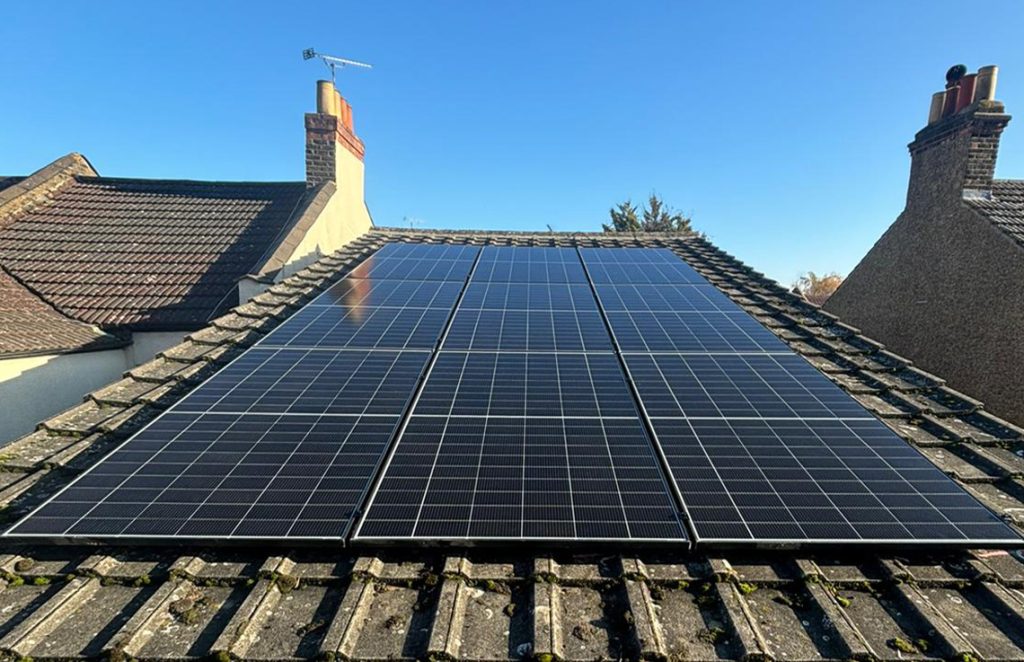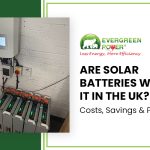
Solar Panels Installation UK
In today’s world, where energy costs are soaring and environmental concerns are at the forefront, harnessing the power of renewable energy sources has become increasingly crucial for UK homeowners. Among the various options available, solar uk panels and batteries stand out as a game-changing solution, offering a multitude of benefits that extend far beyond just financial savings.
Embracing solar energy not only reduces your carbon footprint but also provides you with a sense of energy independence and reliability. By installing solar panels uk, you can generate your own clean electricity, significantly reducing your reliance on the grid and minimizing the impact of rising energy prices. Furthermore, the integration of solar batteries allows you to store excess energy generated during the day, ensuring a consistent supply of power even when the sun isn’t shining.
The importance of renewable energy for UK homeowners cannot be overstated. As the world grapples with the consequences of climate change, transitioning to sustainable energy sources has become a collective responsibility. By adopting solar panel battery installation London, you can play an active role in creating a greener, more sustainable future for generations to come.
Understanding Solar Panels UK
Solar panels are devices that convert sunlight into electricity through a process called the photovoltaic effect. This effect occurs when photons from the sun’s rays strike the solar panel’s photovoltaic cells, typically made of silicon semiconductors. The energy from these photons knocks electrons loose from the silicon atoms, allowing them to flow through the material and generate an electrical current.
There are three main types of ground mount solar available on the market:
Monocrystalline Solar Panels
Monocrystalline solar panels are made from a single, continuous crystal structure of silicon. They are characterized by their uniform dark black color and are considered the most efficient type of solar panel. Monocrystalline panels typically have an efficiency rate of 15-24%, meaning they can convert 15-24% of the sun’s energy into usable electricity.
Polycrystalline Solar Panels
Polycrystalline solar panels are composed of many silicon crystals rather than a single crystal. They have a distinct speckled blue color and are slightly less efficient than monocrystalline panels, with an efficiency rate of 13-16%. However, polycrystalline panels are generally more affordable and easier to produce.
Thin-Film Solar Panels
Thin-film solar panels are made by depositing thin layers of photovoltaic materials, such as amorphous silicon, cadmium telluride (CdTe), or copper indium gallium selenide (CIGS), onto a solid surface like glass, plastic, or metal. These panels are lightweight, flexible, and can be easily integrated into building materials. However, they have lower efficiency rates compared to crystalline panels, typically ranging from 7-13%.
The efficiency and performance of solar panels london can be influenced by various factors, including the type of panel, the quality of the materials used, the angle of installation, and the amount of sunlight exposure. Monocrystalline panels generally perform better in low-light conditions and have a longer lifespan, while thin-film panels are more suitable for applications where weight and flexibility are important considerations.
Benefits of Installing Solar Panels

Cost Savings on Energy Bills
Installing solar panels can significantly reduce your monthly energy bills, providing long-term financial savings. By generating your own electricity from the sun, you become less reliant on the grid and can offset a substantial portion of your energy costs. As energy solar panels uk price continue to rise, the savings from solar panels become even more substantial over time.
Environmental Benefits (Reducing Carbon Footprint)
Solar energy is a clean and renewable source of power that doesn’t produce harmful greenhouse gas emissions or air pollutants. By transitioning to solar energy, you can significantly reduce your carbon footprint and contribute to a more sustainable future. Each kilowatt-hour of electricity generated by solar panels offsets the equivalent amount of emissions that fossil fuel-based sources would have produced.
Energy Independence and Reliability
With solar panels, you gain greater energy independence and reliability. Unlike traditional energy sources that rely on finite resources and complex distribution networks, solar energy is readily available and can be generated on-site. This means you are less susceptible to power outages, grid failures, or fluctuations in energy prices. Additionally, solar panels can be combined with battery storage systems to provide power during high energy demand when Solar panels UK cost of electricity increases.
Potential Increase in Property Value
Installing solar panels can potentially increase the value of your property. Homebuyers are increasingly attracted to energy-efficient homes with lower utility costs and a reduced environmental impact. Properties with solar panel systems are often more appealing to prospective buyers, as they offer immediate savings and contribute to long-term sustainability.
Solar Batteries: An Essential Component
Solar batteries are a crucial part of a solar energy system, allowing homeowners to store excess energy generated by their solar panels for later use or as a backup power source. These batteries work by converting the direct current (DC) electricity produced by solar panels winter uk into alternating current (AC) electricity that can be used to power homes and appliances.
There are several types of solar batteries available, each with its own advantages and disadvantages:
Lithium-ion Batteries
Lithium-ion batteries are the most common type of solar panel battery used in residential installations. They are known for their high energy density, long lifespan, and low maintenance requirements. Lithium-ion batteries can store a significant amount of energy in a compact space, making them ideal for homes with limited space. However, they tend to be more expensive than other battery types.
Lead-acid Batteries
Lead-acid batteries are a more affordable option for solar energy storage. They have been used for decades in various applications and are widely available. Lead-acid batteries are robust and can withstand harsh conditions, but they have a shorter lifespan and require more maintenance than lithium-ion batteries.
Flow Batteries
Flow batteries are an emerging technology in the solar energy storage market. They store energy in liquid electrolyte solutions, which are pumped through an electrochemical cell. Flow batteries have a longer lifespan and can be easily scaled up or down to meet energy storage needs. However, they are currently more expensive than lithium-ion or lead-acid batteries.
The primary benefit of solar batteries is energy storage, allowing homeowners to store excess energy generated during the day for use at night or during periods of low solar production. This not only reduces reliance on the grid but also provides backup power during outages, ensuring uninterrupted electricity supply for essential appliances and systems.
With solar batteries, homeowners can maximize the use of their solar panels’ energy production, reducing their dependence on the grid and potentially saving money on electricity bills in the long run.
Cost and Financing Options

Installing ground mounted solar panels uk and batteries can be a significant investment for UK homeowners, but there are various financing options available to make it more affordable. The average cost of a solar panel system in the UK ranges from £7,000 to £12,000, depending on the size of the system, the type of panels, and the complexity of the installation solar panels UK.
Batteries for solar storage systems can add an additional cost of £1,500 to £6,000, depending on the capacity and type of battery. However, it’s important to consider the long-term savings on energy bills and the potential increase in property value when evaluating the cost.
One financing option is to take out a loan specifically designed for renewable energy projects. Many banks and lenders offer solar loans with competitive interest rates and flexible repayment terms.
The UK government also offers several incentives and zero VAT to encourage the adoption of solar energy. The Smart Export Guarantee (SEG) scheme allows homeowners to receive payments for the excess electricity their solar panels generate and export back to the grid.
Installation Process
Installing solar panels and batteries is a multi-step process that requires careful planning and execution. Here’s what you can expect:
Site Evaluation and Design
The first step is to have a solar installer evaluate your property to determine the optimal location and configuration for the solar panels. They will consider factors such as roof orientation, shading, and available space. The installer will then design a system tailored to your energy needs and budget.
Solar Panel Installation
Once the designs are in place, the installation team will begin mounting the solar panels on flat roof uk or ground-mounted system. They will also install the racking system that secures the panels in place and ensures proper alignment for maximum energy production.
Electrical Connections
The solar panels will be connected to an inverter, which converts the direct current (DC) electricity produced by the panels into alternating current AC Couple Inverter Charger Installation uk that can be used in your home or fed back into the grid.
Battery Installation
If you’re adding a Solar Battery Storage UK, the batteries will be installed and connected to the inverter and solar panels. This setup allows excess energy produced during the day to be stored for use at night or during power outages.
Final Inspections and Activation
After the installation is complete, a final inspection is done by the electrician and once everything is good, the system can be activated, and you can start generating and using your own solar energy.
Choosing the Right Installer
When it comes to solar panel and battery installation, it’s crucial to choose a reputable and experienced installer. Look for companies that are certified by organizations the Microgeneration Certification Scheme (MCS), Energy Performance Validation Scheme (EPVS, HIES, NAPIT, Trustmark in the UK.
Experienced solar panel installers uk will not only ensure a high-quality solar panel installations uk but also guide you through the process, handle necessary paperwork, and provide valuable advice on system maintenance and monitoring.
Maintenance and Warranties
Solar panels are designed to be low maintenance. Most reputable manufacturers offer warranties on their cost of installation solar panels uk, typically ranging from 20 to 30 years.
Solar batteries also come with warranties, often ranging from 5 to 10 years or based on a certain number of charge cycles. Proper maintenance and adherence to manufacturer guidelines can help extend the lifespan of your solar battery system.
By choosing a reputable installer and following recommended maintenance practices, you can enjoy the benefits of your solar panel and battery system for many years to come.
Common Questions and Misconceptions About Solar Energy

One of the most frequently asked questions by homeowners considering solar panels is “How many solar panels are needed to power a house?” The answer depends on several factors, including your household’s energy consumption, the amount of sunlight exposure in your area, and the efficiency of the solar panels you choose. Generally, a typical UK home requires between 10 and 20 solar panels to meet its electricity needs, but this can vary significantly based on individual circumstances.
Another common question is “Are solar panels worth it?” The short answer is yes, solar panels are absolutely worth the investment for most UK homeowners. While the upfront costs may seem daunting, the long-term savings on energy bills, combined with government incentives and the potential increase in property value, make solar panels a financially wise decision. Additionally, the environmental benefits of reducing your carbon footprint and contributing to a more sustainable future are invaluable.
Regarding misconceptions, one prevalent myth is that solar panels require direct sunlight to function effectively. This is not entirely true. While direct sunlight maximizes their efficiency, solar panels can still generate electricity on cloudy days or in areas with less-than-ideal sunlight exposure. Another misconception is that solar panels require frequent maintenance and have a short lifespan. Modern solar panels are designed to be durable and low-maintenance, with most systems lasting 25 years or more with proper installation and minimal upkeep.
It’s also important to debunk the myth that solar panels are unsightly and detract from a home’s aesthetic appeal. Today’s solar panels come in various designs and can be seamlessly integrated into a property’s architecture, blending in with the overall style and enhancing curb appeal.
Conclusion: Embrace the Future of Renewable Energy
Harnessing the power of the sun through solar panels and batteries is a smart investment for UK homeowners seeking to reduce their energy bills, increase energy independence, and contribute to a more sustainable future. By installing solar panels, you can generate clean, renewable electricity from a virtually limitless source – the sun. Coupled with efficient solar batteries, you can store excess energy for use during periods of low sunlight or power outages, ensuring a reliable and consistent supply of electricity.
The benefits of solar panels and batteries extend far beyond financial savings. By reducing your reliance on fossil fuels, you actively participate in the fight against climate change, minimizing your carbon footprint and promoting a cleaner environment for generations to come. Additionally, the increased energy independence provided by solar power systems can enhance the value of your property, making it an attractive investment for the future.
Take the first step towards a more sustainable and cost-effective energy solution by considering solar panels and batteries for your home. Embrace the future of renewable energy and join the growing community of environmentally conscious homeowners who are making a positive impact on the planet while enjoying the numerous advantages of solar power.
Evergreen Power: Pioneer in Solar Panels & Batteries Installation
Are you ready to embrace the power of solar energy and take control of your energy needs? Evergreen Power UK is here to guide you every step of the way. Our team of experts is dedicated to providing top-notch solar solutions tailored to your specific requirements.
Contact us today for a free consultation and let us help you unlock the numerous benefits of solar panels and batteries. Our knowledgeable professionals will assess your energy needs, evaluate your property, and recommend the best solar system to meet your goals.
Don’t hesitate to take the first step towards energy independence, cost savings, and a greener future. Email us at info@evergreenpoweruk.com or call us at 020 3793 7323 to schedule your free consultation. Let Evergreen Power UK be your trusted partner in harnessing the power of the sun.
Written by: Kyler Walter

- Kyler Walter is a passionate advocate for renewable energy and sustainable living. As a leading voice at Evergreen Power UK, he specializes in solar energy solutions and has played a vital role in promoting innovative, eco-conscious technologies across the UK.
Latest entries
 Solar BatteriesDecember 4, 2025Are solar batteries worth it in the UK? Costs, savings & payback
Solar BatteriesDecember 4, 2025Are solar batteries worth it in the UK? Costs, savings & payback  SolarNovember 6, 2025Do solar panels work in winter in the UK? What to expect
SolarNovember 6, 2025Do solar panels work in winter in the UK? What to expect SolarAugust 8, 2025Are You Eligible for UK Solar Incentives? Here’s What to Know (2025 Guide)
SolarAugust 8, 2025Are You Eligible for UK Solar Incentives? Here’s What to Know (2025 Guide) SolarJuly 28, 2025How Long Do Solar Panels Last? And What You Can Do to Extend Their Life
SolarJuly 28, 2025How Long Do Solar Panels Last? And What You Can Do to Extend Their Life
 020 3793 7323
020 3793 7323


